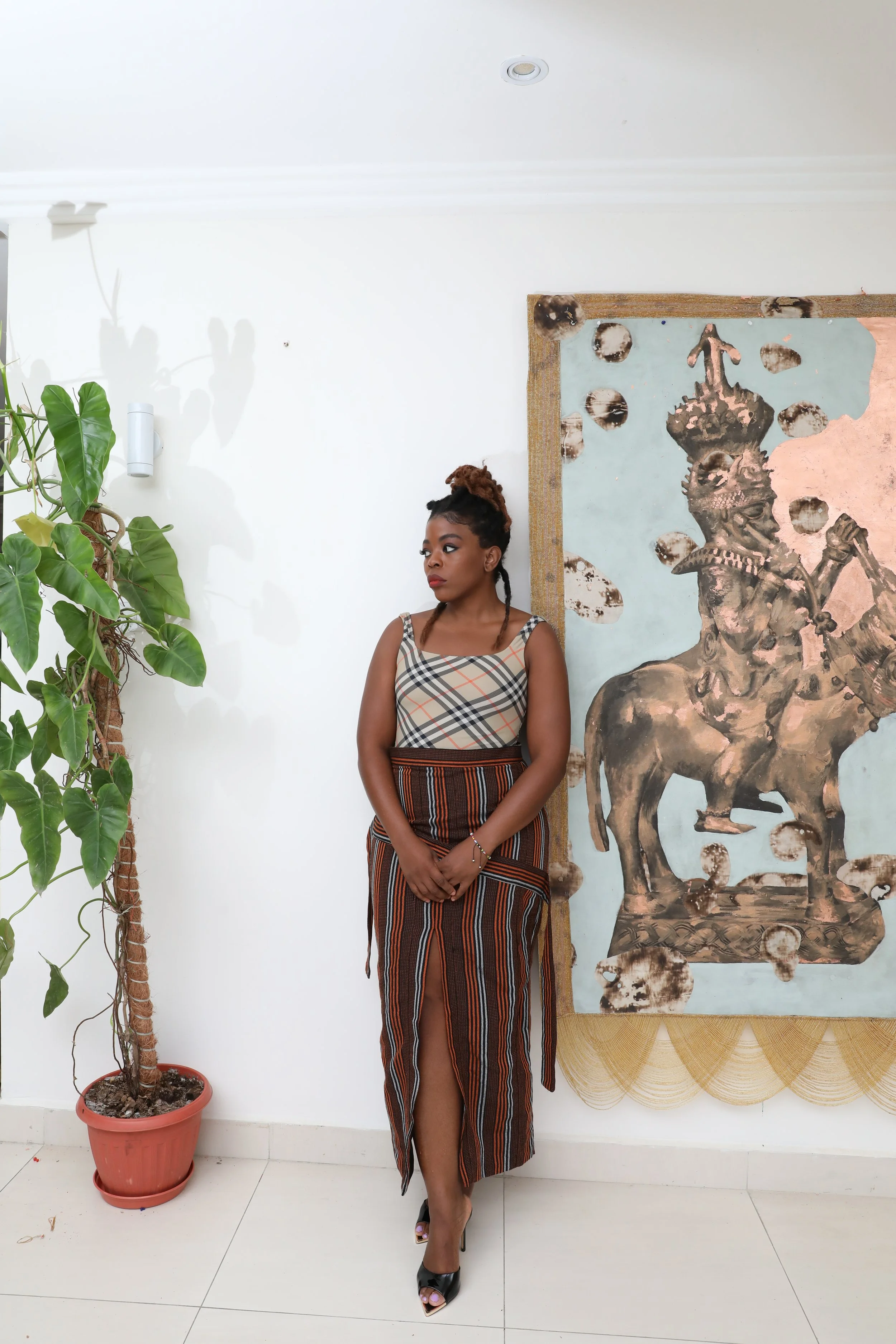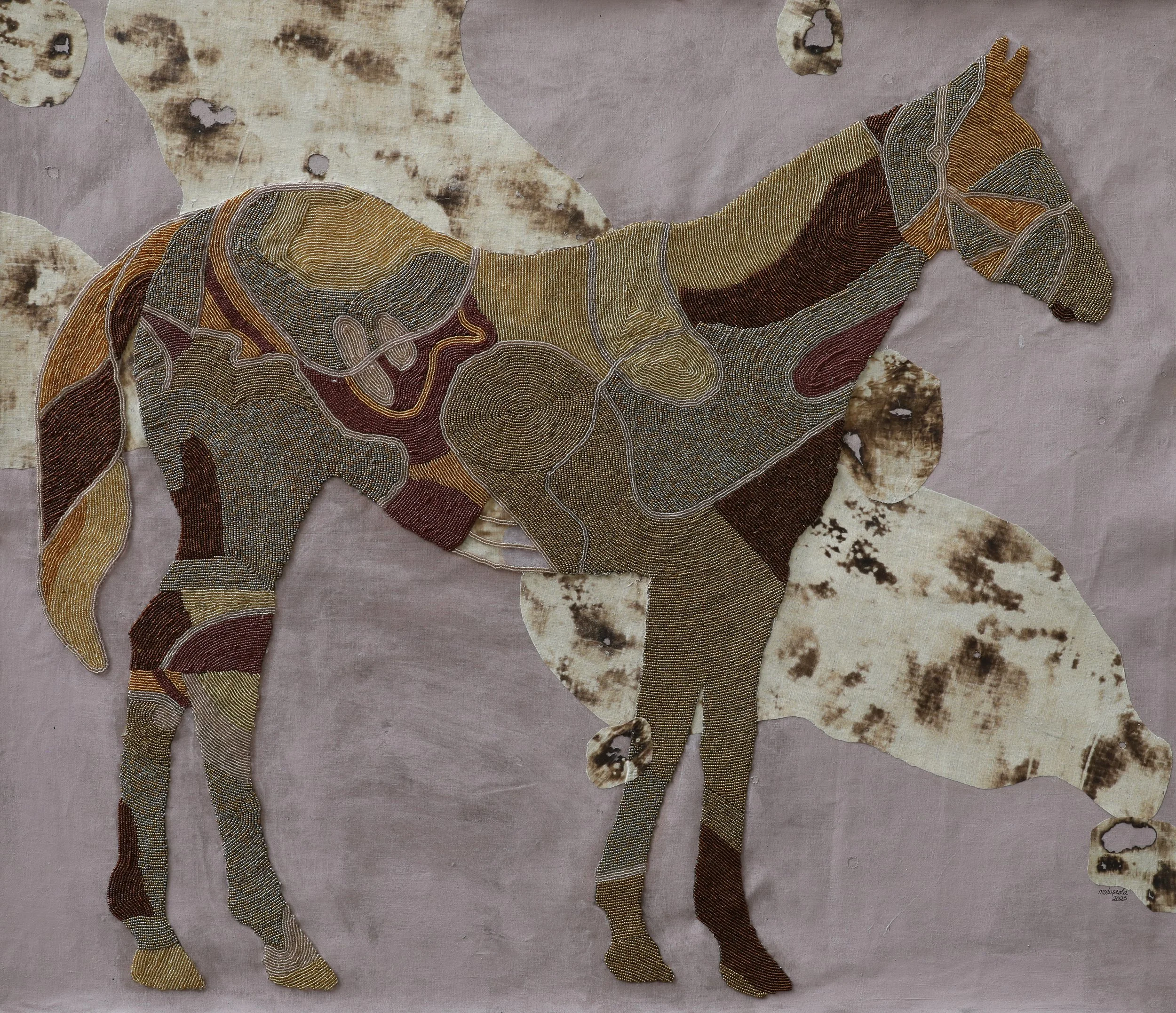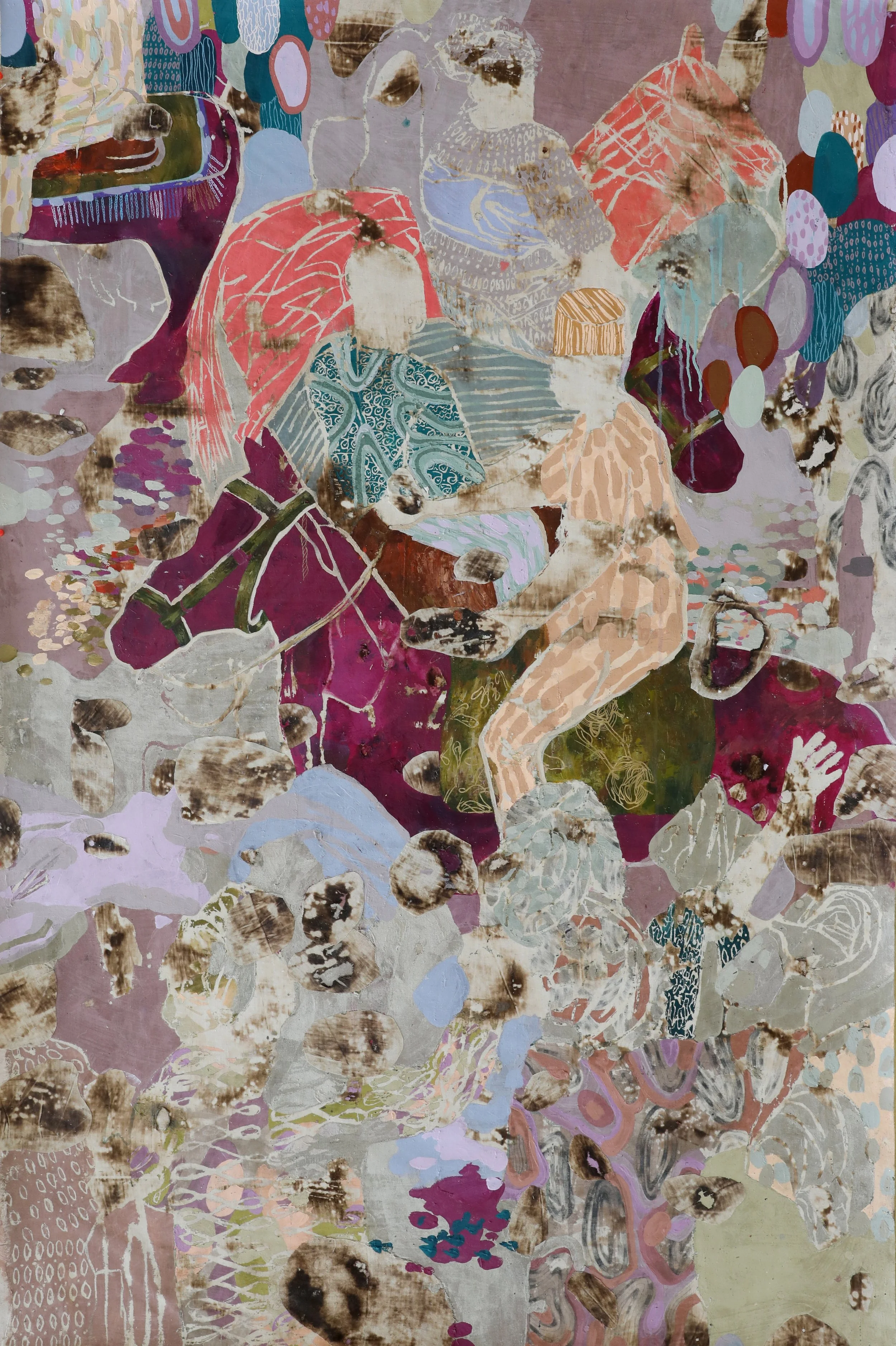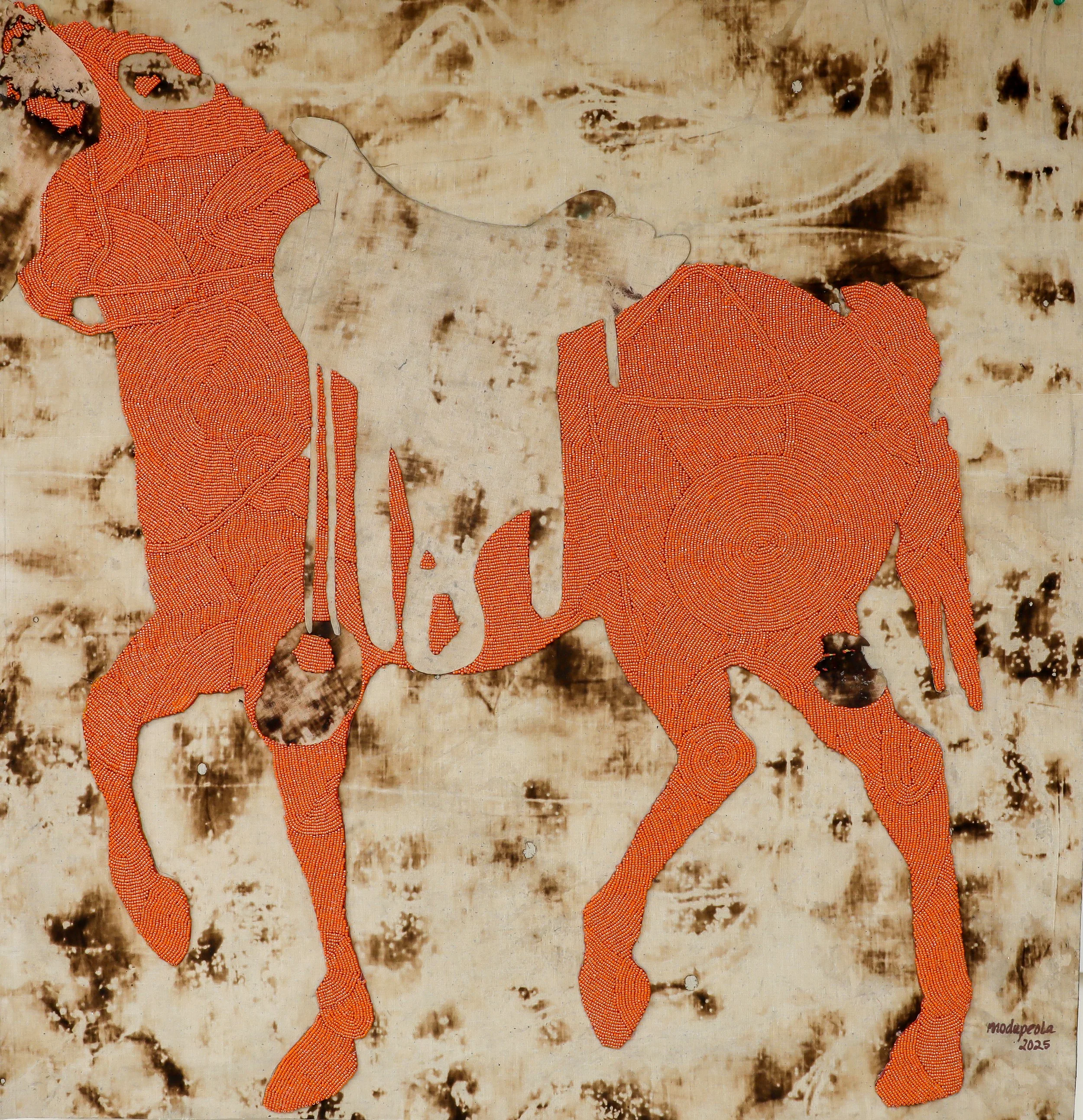Kristin Hjellegjerde Gallery presents “Also What Are We Wearing?”
A Solo Exhibition by Modupeola Fadugba in West Palm Beach
Nov 1st - Nov 29th, 2025
Drumbeats reverberating through a crowd, a dazzle of color, the jangle of beads and high-stepping hooves. Also, What Are We Wearing, Modupeola Fadugba’s solo exhibition at Kristin Hjellegjerde West Palm Beach, transports us to the Ojude Oba festival, a riotous annual celebration of Yoruba heritage, honoring the Awujale, the paramount ruler of the Ijebu people. Known for its elaborate equestrian processions, resplendent attire, and communal traditions, the festival is a vibrant, bustling occasion. Fadugba, however, turns her attention to what happens before the spectacle: the intimate acts of preparation that shape the festival’s unfolding. What happens before we step into the public eye? How do the choices we make reflect our identities and heritage?
As in her earlier work with swimmers, this latest body of work emerges from site-specific cultural research. Fadugba spent time in Yorubaland, living and working among local artisans – tailors, beadworkers, saddle makers – learning not only how objects are made but how these practices are bound up in histories, identities, and place. Though these people may never ride in the parade, their labor is inseparable from its beauty. An intricately beaded saddle floating in a mottled surface – Fadugba’s signature burnt raw canvas – pays tribute to their stories by not only holding up the saddle as an object to be admired and studied on its own terms, but as part of an ongoing and evolving creative process, one that is as fragile as it is transformative.
The beadwork as seen in this exhibition is the result of the artist seeking out mentorship: as a way of not just expanding her own practice, but also of embedding herself within the artisanal communities she depicts. Working closely with a self-trained textile and bead artist, Fadugba uses beads not just as decoration but as material, surface, and symbolism. In Head to the Dressing Room, the horse’s body is composed entirely of beads that ripple and swirl, evoking the movement of muscle while also highlighting the central role played by these animals within the festival. Elsewhere, in Agbada Men II – a work depicting a sea of figures wearing identical green outfits, a nod to the concept of asoebi (coordinated attire worn by groups as a principle of collectivity, repetition, and identity) – the beads become the frame. Here, they serve to contain, unify, and elevate the image, but the boundary is also unsettled by patches of burnt canvas and by a fringe of loosely hanging beads, again suggesting notions of precarity and change.
In this way, Fadugba resists fixedness: her interest lies less in documenting objects or events than in capturing the lived, embodied experience of tradition in motion. Faces are abstracted, canvases charred, forms fluid. Every saddle, garment, and bead carries traces of hands, histories, and cultural memory, linking past and present in a living tradition. In encountering these works, we glimpse the care that precedes performance and the beauty that emerges from preparation, inviting reflection on what it means to belong and to carry tradition forward.
Also, What Are We Wearing? is a glimpse behind the canvas into beads, fabric, and fire. This short film captures the rhythm of preparation behind Yoruba pageantry, where craft becomes care and every stitch tells a story.
Bead and Bronze, Reframed
Acrylic, metal leaf, ink, and beads on burned Canvas
67 x 45 in.|170.18 x 114.3 cm
2025
Bead and Bronze, Reframed recontextualizes a historic equestrian figure from the Benin Museum, placing it against a pale blue field scarred by burns and punctuated with traces of gold. The figure, rendered in bronze tones, appears both monumental and spectral. By isolating this object from its museological frame and embedding it within her own material language, Fadugba interrogates how heritage is preserved, displayed, and consumed. The beaded border and scalloped fringe invoke Yoruba ceremonial aesthetics, positioning the work at the threshold between archive and performance. Here, beading functions not as ornament but as a temporal seam—binding ancestral legacy to contemporary authorship.
Heading to the Dressing Room
Acrylic and beads on burned Canvas
52 x 40 in|132.08 x 101.6 cm
2025
This work presents a fully beaded horse, rendered with obsessive precision, standing against a background visibly burned and scarred. The contrast between the delicate, almost devotional labor of the beadwork and the violence suggested by the scorched surface creates a charged tension. Beading here is not ornament, but rather, it is endurance and structure. Each bead holds the rhythm of craft traditions often dismissed or feminized, and repositions them as forms of presence. The horse, a symbol of prestige and public display, is reframed through this painstaking surface, not just dressed, but armored in care. In the face of fire, fragmentation, or erasure, the integrity of the craft holds. What is assembled bead by bead refuses to be undone.
Pink Socks
Acrylic and beads on burned Canvas
76.5 x 50 in. |194.31 x 127 cm
2025
In Pink Socks, Fadugba stages an equestrian figure cloaked in the ceremonial grandeur of agbada robes, poised atop a vivid pink horse that seems to shimmer between motion and stillness. The composition pulses with layered hues, crimson, ochre, and deep plum, while scorched voids ripple across the surface like memory’s interruptions. A beaded fringe frames the work, suggesting both regality and fragility, while the rider’s facelessness resists singular identity, allowing the figure to stand as a vessel for collective tradition. This work draws on the Ojude Oba festival visual spectacle but pauses the procession mid-stride, turning its pageantry inward. Beads serve here as both ornament and anchor: markers of prestige that also tether the fleeting spectacle to a lineage of slow, exacting craft.
Looking For A Coral Unicorn
Acrylic, graphite, and ink on burned Canvas
68 x 45 in|172.2 x 114.3 cm
2025
In Looking For A Coral Unicorn, two riders emerge atop magenta and coral horses, their forms suspended between presence and dissolution. The surface bears traces of burning, staining, and layered mark-making, echoing the unfinished processes of tailoring, dyeing, and beadwork that precede the Ojude Oba festival. The work foregrounds the cultural labor behind spectacle, while the coral hue anchors the composition in Yoruba regal aesthetics. By staging the riders within a fragmented ecology of color and gesture, the painting reveals the invisible artisanship embedded in communal appearances.
Tailor, Don’t Sew Me Nonsense
Acrylic, graphite, ink, embroidery, and metal leaf on burned Canvas
70 x 45.5 in.|177.8 x 115.57 cm
2025
In Tailor, Don’t Sew Me Nonsense, the figure of a seamstress is set within a fractured surface, her patterned attire and sewing machine contrasted by a gleaming bottle of Coca-Cola. The work positions tailoring as intellectual labor, foregrounding the often-unseen hands that construct ceremonial appearances. The title invokes a popular Nigerian phrase that collapses humor and critique, suggesting the cultural stakes embedded in acts of making. The presence of the Coke bottle, mundane yet iconic, threads nostalgia into the scene, marking the temporal coexistence of local craft traditions and global consumer flows. The work reframes sewing as both care and critique, locating contemporary Nigerian identity within the tension between preservation and reinvention.
Agbada Men II
Acrylic and Beads on burned Canvas
58 x 41 in.|147.32 x 104.14 cm
2025
Agbada Men II presents a gathering of figures clothed in voluminous agbada attire, framed by beadwork that extends the logic of ornament beyond the canvas itself. The composition underscores Yoruba sartorial traditions as both cultural archive and contemporary theory, where cloth and bead signify intellect, status, and collective belonging. By integrating beading into both surface and frame, the work resists rigid boundaries between artwork and artifact, function and ornament. It offers a meditation on masculinity, ceremony, and the collaborative networks of labor that sustain Yoruba aesthetics.
Beaded Saddle
Embroidery and Beads on burned Canvas
38 x 31.5 in.|96.52 x 80.01 cm
2025
Suspended against a burned and fractured surface, Beaded Saddle presents the ceremonial saddle as both fragment and monument. The fine beadwork and embroidery resist the violence implied by the scorched ground, positioning craft as an act of survival. By dislocating the saddle from its utilitarian context, the work reveals it as a repository of ancestral knowledge and aesthetic theory. Here, ornament becomes structure: an architecture of care that holds cultural memory together even as the fabric bears signs of rupture.
Checkered Skirt
Acrylic, graphite, and ink on burned Canvas
38 x 31.5 in.|96.52 x 80.01 cm
2025
In this piece, Modupeola Fadugba turns her attention to the saddle, rendered in a checkered pattern across a black canvas. Using pencil, bronze paint, and ink, she layers subtle textures that call attention to the object’s form and symbolic weight.
In the absence of horse or rider, the saddle is transformed from a mere accessory into a central subject. It becomes an emblem of passage and potential—an object that carries histories of movement, endurance, and unseen labor. The shimmer of bronze punctuates the darkness, suggesting both resilience and quiet dignity.
Gucci This, Gucci That
Acrylic, ink, metal leaf, and beads on burned Canvas
38 x 31.5 in.|96.52 x 80.01 cm
2025
In this work, Modupeola Fadugba renders a bronze-toned horse set against a luminous orange background. Though its head is cropped from view, the figure radiates presence and strength. The metallic surface suggests durability and permanence, while the vibrant orange ground charges the composition with energy and warmth.
A beaded frame surrounds the painting, adding rhythm and intricacy that extend the work beyond the pictorial field. The beads catch light in ways that echo the shimmer of bronze, transforming the frame into both ornament and reinforcement.
Rather than presenting absence as loss, Fadugba elevates what remains—fragment as monument—inviting viewers to find beauty and endurance in partial forms, and to recognize continuity even in what appears incomplete.
Bead Me Coral
Beads on burned Canvas
42 x 40 in.|106.68 x 101.6 cm
2025
Bead Me Coral isolates the ceremonial horse as an autonomous figure, stripped of spectacle yet charged with its residue. The body is constructed entirely from coral beads, their density and repetition foregrounding process over image. The scorched ground introduces rupture, asserting the work’s resistance to erasure. Beading operates here not as embellishment but as infrastructure, an accumulation of touch that anchors Yoruba ceremonial aesthetics within a contemporary discourse of endurance. The horse ceases to be a vehicle; it becomes a site where time, labor, and cultural memory coalesce.
Saddled Between Frames
Acrylic, graphite, inks, and beads on burned Canvas
52 x 40.5 in|132.08 x 102.87 cm
2025
In Saddled Between Frames, Fadugba isolates a ceremonial saddle, suspending it within a field of scorched canvas and muted violet. Rendered in intricate graphite detailing and encircled by glimmering beaded borders, the saddle becomes both artifact and apparition, caught between presence and disappearance. The burn marks ghost across its surface like traces of use, history etched into skin, while the beaded scallops at the painting’s edge suggest a stage curtain about to part. By dislocating the saddle from its rider, Fadugba redirects our gaze from spectacle to infrastructure, honouring the unseen labour and cultural memory embedded in its making. It is a portrait not of performance, but of the quiet architectures that make performance possible.
Men in Black
Acrylic, graphite, ink, and beads on Burned Canvas
75 x 45 in.|190.5 x 114.3 cm
2025
Men in Black is a monochromatic work. Modupeola Fadugba renders a rider on horseback in the raw cream and burned texture, the horse’s head cropped to unsettle traditional equestrian imagery. What is usually a symbol of triumph becomes an ambiguous silhouette, charged with absence yet present.
The painting is encased in a hand-beaded frame, linking the work to ritual and craft. Fadugba's choice is personal. She grew up watching women bead with quiet discipline and artistry. This memory surfaces here, transforming the frame into both ornament and testimony.
By pairing the austerity of black paint with the delicacy of beads, Fadugba opens questions of visibility, power, and memory—what is seen, what is withheld, and how absence itself can hold meaning. In all of this, she chose to leave the men in black. Who are they? Where did they come from?
The Quiet Before the Colors
Acrylic, graphite, and ink on burned Canvas
36 x 24 in|91.44 x 60.96 cm
2025
This work depicts a coral horse and the spectral outline of an unseen horseman, accompanied by a young figure to the side. The subdued palette and partially rendered forms emphasize the liminal space before the festival begins—the gathering of fabrics, the quiet labor of artisans, and the anticipation of performance. The burned textures destabilize the line between material and memory, while coral signals both continuity and ceremony. In its restraint, the painting attends to what remains hidden before spectacle erupts into full color.













